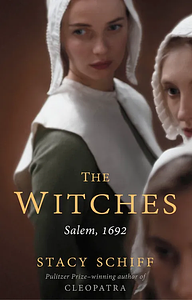Take a photo of a barcode or cover
informative
slow-paced
challenging
informative
tense
slow-paced
informative
slow-paced
I read Stacy Schiff's [b:Cleopatra: A Life|7968243|Cleopatra A Life|Stacy Schiff|https://images.gr-assets.com/books/1294098301s/7968243.jpg|12020129] a few years back and hated it. It was with some mixed feelings that I saw that she'd written a new book on the Salem Witch Trials, a topic that endlessly fascinates me. I saw a couple of quotes from it and was intrigued enough to give her another go. I didn't like Schiff's take on Cleopatra, or the way she handled the history, but perhaps a more recent time period would fit her better.
And, I admit, it was kind of fun. But ultimately disappointing.
There's nothing really new to find here. There's no new angle, no new theory. Schiff talks about the multiple attempts to explain the trials but ultimately washes her hands of any attempt to discuss them critically, much less offer her own interpretation of events. It feels more like she's just reeling off the theories, crying "done!" and moving on. Even when she tries to explain certain aspects of the trial (e.g. sleep deprivation could explain hallucinations which explains the imagery in some of the confessions), it feels like she's reeling off a list rather than discussing her own ideas.
I guess you could say that the first chapter gives a new spin, as it serves as a place for Schiff to exorcise her opinions about Salem, especially as a cultural rather than historical event. But it was tedious. Overly wordy to the point where I couldn't decide whether Schiff wanted to wow me with her prose skills, wow me with her insight or hide the fact that she may not be saying much at all.
But, perhaps, it's unfair to expect Schiff to find a new spin on such an old subject. Let's talk about the content, then.
I did find the text confusing at points. This is partly on the Puritans themselves, who shared a predilection for constantly recycling a very short list of baby names, the end result being that a lot of people had the same name. I also found it difficult to work out a timeline to the events, wondering whether Schiff was writing about different aspects of the trials that were occurring concurrently but were presented as the next part in the story or whether these aspects did naturally follow each other in order.
One of the things that bugged me about Schiff's Cleopatra: A Life was that she would fail to mention facts that counteracted her vision of the history. Hence, she bewailed Julius Caesar leaving Cleopatra out of his will, but ignored the fact that Roman law forbade non-Romans (which Cleopatra and her son were) from being benefactors in Roman wills.
In The Witches, Schiff presents Tituba as a sort of controlling force in the trials. Her confession, with its vivid imagery, sets the tone for the trial. Schiff builds Tituba up as this iconic, influential figure, almost like she made her confession up for own entertainment. Guess what, though? Tituba's confession was beaten out of her.
Which you wouldn't know from reading Schiff's account.
Another time, Schiff theorises that Elizabeth Procter was "sacrificed for her husband's misdeeds", by which I assume she means John Proctor's vocal objection to and disbelief of the afflicted girls. Naturally, I furrow my brow because only a page or so ago, Schiff was talking about Elizabeth Procter as being an easy target as she was the descendent of an accused witch. Schiff also fails to account for the fact that Elizabeth Procter was accused before Procter was ever named a suspect.
I was curious as to where Schiff got her descriptions from, as I had never heard that Mary Warren was a "strikingly pretty" orphan or that Abigail Williams was blonde. My attempts to go through her notes proved fruitless. However, if I could have stopped Schiff from describing the girls and women in this book as variations of "pretty", "lovely", "beguiling" and, at one stage, "saucy", I would have gladly done so. I suspect she felt this added character to her narrative, but if so, it was exceedingly transparent, and instead, once again, I saw an individual conflating a woman's appearance with her importance and sexualising the accused and afflicted girls unnecessarily, almost presenting them as little temptresses.
So what did I enjoy about the narrative? I did enjoy reading about the trials once again, returning to the world. But that has less to do with Schiff and more the topic being presented a in a mostly-coherent way. There are also much better books about the Salem Witch Trials out there. I recommend [b:A Storm of Witchcraft|21874527|A Storm of Witchcraft The Salem Trials and the American Experience|Emerson W. Baker|https://images.gr-assets.com/books/1403819826s/21874527.jpg|41165811], [b:Six Women of Salem: The Untold Story of the Accused and Their Accusers in the Salem Witch Trials|17290747|Six Women of Salem The Untold Story of the Accused and Their Accusers in the Salem Witch Trials|Marilynne K. Roach|https://images.gr-assets.com/books/1373660888s/17290747.jpg|23913001] and [b:A Delusion of Satan|89522|A Delusion of Satan The Full Story of the Salem Witch Trials|Frances Hill|https://images.gr-assets.com/books/1347582540s/89522.jpg|86401].
And, I admit, it was kind of fun. But ultimately disappointing.
There's nothing really new to find here. There's no new angle, no new theory. Schiff talks about the multiple attempts to explain the trials but ultimately washes her hands of any attempt to discuss them critically, much less offer her own interpretation of events. It feels more like she's just reeling off the theories, crying "done!" and moving on. Even when she tries to explain certain aspects of the trial (e.g. sleep deprivation could explain hallucinations which explains the imagery in some of the confessions), it feels like she's reeling off a list rather than discussing her own ideas.
I guess you could say that the first chapter gives a new spin, as it serves as a place for Schiff to exorcise her opinions about Salem, especially as a cultural rather than historical event. But it was tedious. Overly wordy to the point where I couldn't decide whether Schiff wanted to wow me with her prose skills, wow me with her insight or hide the fact that she may not be saying much at all.
But, perhaps, it's unfair to expect Schiff to find a new spin on such an old subject. Let's talk about the content, then.
I did find the text confusing at points. This is partly on the Puritans themselves, who shared a predilection for constantly recycling a very short list of baby names, the end result being that a lot of people had the same name. I also found it difficult to work out a timeline to the events, wondering whether Schiff was writing about different aspects of the trials that were occurring concurrently but were presented as the next part in the story or whether these aspects did naturally follow each other in order.
One of the things that bugged me about Schiff's Cleopatra: A Life was that she would fail to mention facts that counteracted her vision of the history. Hence, she bewailed Julius Caesar leaving Cleopatra out of his will, but ignored the fact that Roman law forbade non-Romans (which Cleopatra and her son were) from being benefactors in Roman wills.
In The Witches, Schiff presents Tituba as a sort of controlling force in the trials. Her confession, with its vivid imagery, sets the tone for the trial. Schiff builds Tituba up as this iconic, influential figure, almost like she made her confession up for own entertainment. Guess what, though? Tituba's confession was beaten out of her.
Which you wouldn't know from reading Schiff's account.
Another time, Schiff theorises that Elizabeth Procter was "sacrificed for her husband's misdeeds", by which I assume she means John Proctor's vocal objection to and disbelief of the afflicted girls. Naturally, I furrow my brow because only a page or so ago, Schiff was talking about Elizabeth Procter as being an easy target as she was the descendent of an accused witch. Schiff also fails to account for the fact that Elizabeth Procter was accused before Procter was ever named a suspect.
I was curious as to where Schiff got her descriptions from, as I had never heard that Mary Warren was a "strikingly pretty" orphan or that Abigail Williams was blonde. My attempts to go through her notes proved fruitless. However, if I could have stopped Schiff from describing the girls and women in this book as variations of "pretty", "lovely", "beguiling" and, at one stage, "saucy", I would have gladly done so. I suspect she felt this added character to her narrative, but if so, it was exceedingly transparent, and instead, once again, I saw an individual conflating a woman's appearance with her importance and sexualising the accused and afflicted girls unnecessarily, almost presenting them as little temptresses.
So what did I enjoy about the narrative? I did enjoy reading about the trials once again, returning to the world. But that has less to do with Schiff and more the topic being presented a in a mostly-coherent way. There are also much better books about the Salem Witch Trials out there. I recommend [b:A Storm of Witchcraft|21874527|A Storm of Witchcraft The Salem Trials and the American Experience|Emerson W. Baker|https://images.gr-assets.com/books/1403819826s/21874527.jpg|41165811], [b:Six Women of Salem: The Untold Story of the Accused and Their Accusers in the Salem Witch Trials|17290747|Six Women of Salem The Untold Story of the Accused and Their Accusers in the Salem Witch Trials|Marilynne K. Roach|https://images.gr-assets.com/books/1373660888s/17290747.jpg|23913001] and [b:A Delusion of Satan|89522|A Delusion of Satan The Full Story of the Salem Witch Trials|Frances Hill|https://images.gr-assets.com/books/1347582540s/89522.jpg|86401].
Wow, this one was honestly a struggle to get through. The events it wanted to describe were interesting but the writing style felt dense, overly description, and included way too much. Several hours into reading it I just started speed reading until I found something interesting.
It was also hard to tell what the author thought was true versus fantasy, she talked about so-and-so appearing in the rafters with the same style that she used to say that so-and-so rode a horse across town. It honestly felt confusing.
I don't actually think I'd recommend this to anyone, in fact as a result of our bookclub reading it we ended up recommending a different book and two different podcasts.
Time to Read: 10:33
It was also hard to tell what the author thought was true versus fantasy, she talked about so-and-so appearing in the rafters with the same style that she used to say that so-and-so rode a horse across town. It honestly felt confusing.
I don't actually think I'd recommend this to anyone, in fact as a result of our bookclub reading it we ended up recommending a different book and two different podcasts.
Time to Read: 10:33
informative
slow-paced
Meh. I was very excited because I LOVED Cleopatra. I had no idea Schiff was going to spend HOURS of this book on the mundanity of the narrative, and yet it was extremely boring. I wanted more analysis, and a deeper look into the Salem Witch Trials. I was confused by the constant narrative that described the witchcraft as real and then as a form of hysteria and persecution. I suppose Schiff should stay in biography?



